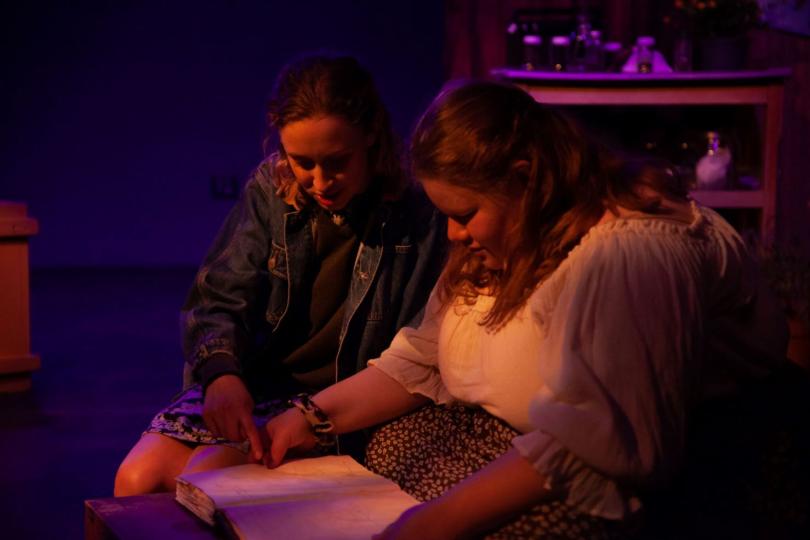A Predictive Representation of Reproductive Regression

The mission of Uprising Theatre Company is to connect art with action in the community, and for their fifth season, they are certainly making the effort to rise to new heights. This season they are planning to give voice to four transgender and non-binary playwrights to steer public conversation toward stories of people that are being inadequately represented in theater.
In alignment with this effort, Uprising is also incorporating an array of new talent who identify across the gender spectrum, many of whom have not been allowed to fully participate in theater. This ambitious goal means that the cast of Dr. Voynich and Her Children was of varying skill levels. While there were a few moments of strained dialogue, this cast brings playwright Leanna Keyes’ plot to life.
Dr. Voynich and Her Children is set in a dystopian future, long past the “Trump Days.” Here birth control and abortion are illegal, and Ivanka Trump has already come and gone as our first female president. In this world, should you end up pregnant, your only hope lies in convincing an herbalist to help you with some tea or, if you’re in dire enough straights, a coat hanger.
Tara Grimmer plays titular character Dr. Rue Voynich, a traveling herbalist who makes her living by selling plants and herbal concoctions to “Heartland” or “Coastal” (read conservative or progressive) citizens, and Katherine Fredrikson plays Fade, her apprentice/daughter. The plot picks up as Hannah (Audrey Parry) and her mother Jessica (Lynda Dahl) come into the shop, and Hannah secretly requests that Fade help her to have an abortion without her inquisitive mother finding out. Shortly after, we also meet Harrison (Mel Demulling), the local sheriff who has an ongoing clandestine relationship with Dr. Voynich when she is in town.
The small performance space and lack of movement in the set (design by Maggie Mae Sulentic) creates an intimacy that bonds us to the characters quickly. This familiarity is further accentuated with the sound (Ryan Lee) and costume design (Alicia Smiley). This team creates an environment that makes us feel like we are in a friend’s backyard on a summer evening: women in flowy dresses, crickets chirping, a campfire lit, and the “golden oldies” of the early 2000s tunes playing on the radio. Viewers are left with the impression of the high heat of summer and all that comes with it: the sensuality and the madness.
This Heartland heat is felt between all the characters as Harrison and Voynich restart their intense, covert relationship, Jessica and Voynich share a heartfelt evening of dancing and intimate discussion, and Fade and Hannah begin to fall in love as they plot out how to secretly perform Hannah’s abortion.
As frequently comes along with the topic of abortion, Dr. Voynich and Her Children includes many conflicting opinions. Hannah holds a steadfast determination to have an abortion and, while Voynich and Fade are pro-choice, Jessica and Harrison are rule followers that hold a more conservative view in alignment with the law, which has dictated 80 years imprisonment for the murder of an unborn.
But this is not just a story of abortion. Through the direction of Ashley Hovell, this production puts emphasis on the relationships between mothers and daughters, the dynamics of gender in sexual relationships, and the importance of knowledge: who holds it and the mystery surrounding the unknown or misunderstood. Sexual and reproductive health are foreign concepts in this future, as we see when Hannah informs Dr. Voynich that she thinks she’s pregnant because she’s “swallowed” a lot, asking, “how else would the baby get into the belly?” Jessica is equally ignorant of her own reproductive process, asking Dr. Voynich why it is that women bleed. This knowledge has been hidden from the public; even basic anatomy is information that has been concealed in a mysterious book which holds 6,000 years of herbalist medicinal history. In a comical moment, we watch as Fade and Hannah page through this book and struggle to pronounce words they have never encountered before, such as “uterus” and “cervix.”
In a passionate finale, Fade is confronted by Jessica for performing Hannah’s abortion, and unknowingly admits it on tape. Harrison enters and threatens to bring Fade to jail, but Dr. Voynich steps up to take the fall, and Harrison cannot set aside his feelings to take her in Fade’s place. Since they are at a standstill, a deal is made which allows Fade and Dr. Voynich to continue traveling while no longer conducting any abortions, but they must burn the book of herbalist knowledge. Following this, Hannah confronts her mother and decides to join Fade and Dr. Voynich on the road as an advocate.
This timely piece reflects the past and highlights the necessity to avoid this regression as a potential future in the hopes of creating a brighter one. In a world where many people do not take the time to truly listen to each other, this piece asks us to slow down and try to understand one another’s needs.


